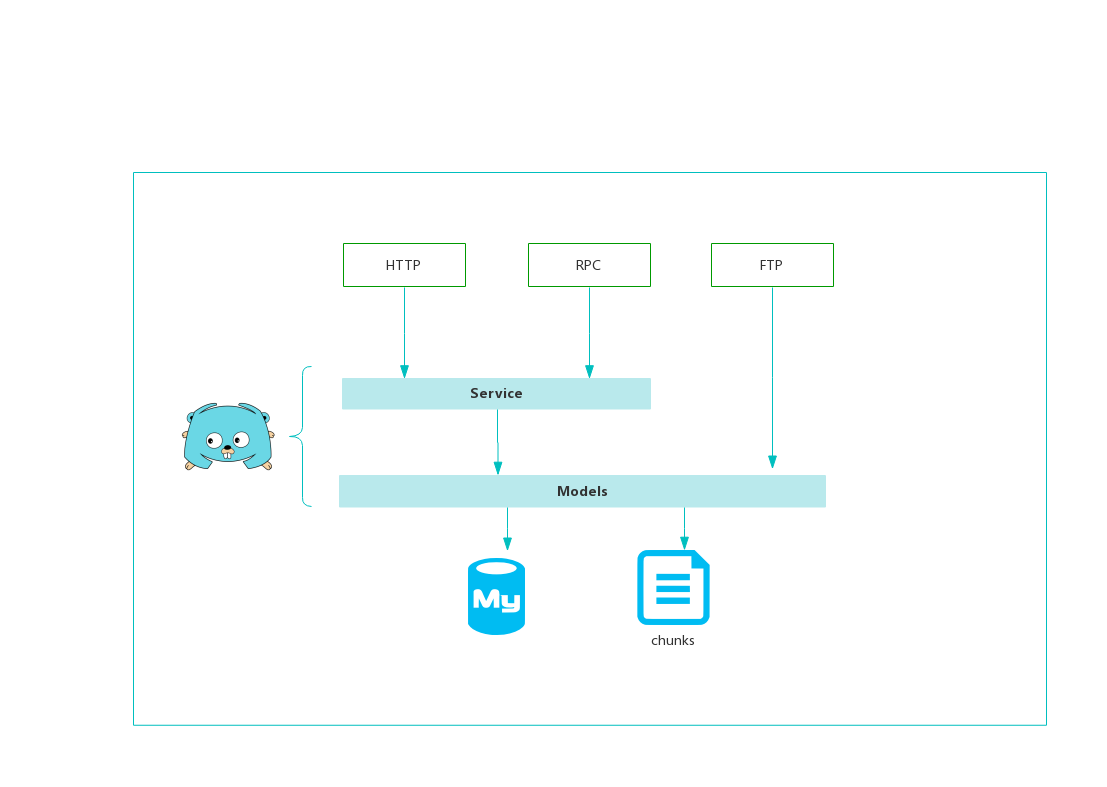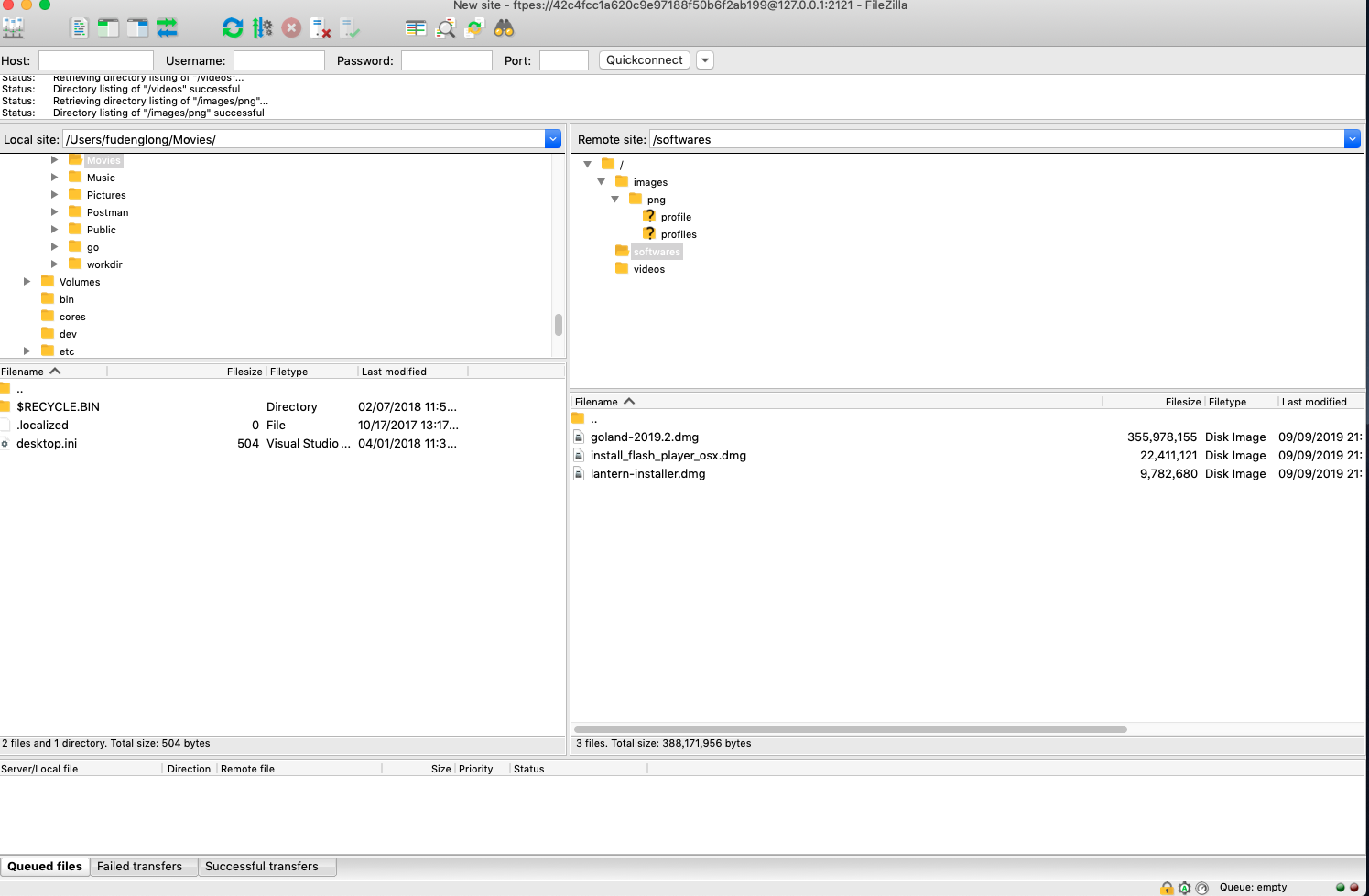Bigfile is a file transfer system, supports http, ftp and rpc protocol. Designed to provide a file management service and give developers more help. At the bottom, bigfile splits the file into small pieces of 1MB, the same slice will only be stored once.
In fact, we built a file organization system based on the database. Here you can find familiar files and folders.
Since the rpc and http protocols are supported, those languages supported by grpc and other languages can be quickly accessed.
More detailed documents can be found here
-
Support HTTP(s) protocol
- Support rate limit by ip
- Support cors
- Support to avoid replay attack
- Support to validate parameter signature
- Support Http Single Range Protocol
-
Support FTP(s) protocol
-
Support RPC protocol
-
Support to deploy by docker
-
Provide document with English and Chinese
There are kinds of ways to install Bigfile, you can find more detailed documentation here English 简体中文
- generate certificates
bigfile rpc:make-cert
- start server
bigfile multi:server
This will print some information as follows:
[2019/09/19 15:38:32.817] 56628 DEBUG bigfile http service listening on: https://0.0.0.0:10985
[2019/09/19 15:38:32.818] 56628 DEBUG Go FTP Server listening on 2121
[2019/09/19 15:38:32.819] 56628 DEBUG bigfile rpc service listening on: tcp://[::]:10986
package main
import (
"fmt"
"io/ioutil"
libHttp "net/http"
"strings"
"time"
"github.com/bigfile/bigfile/databases/models"
"github.com/bigfile/bigfile/http"
)
func main() {
appUid := "42c4fcc1a620c9e97188f50b6f2ab199"
appSecret := "f8f2ae1fe4f70b788254dcc991a35558"
body := http.GetParamsSignBody(map[string]interface{}{
"appUid": appUid,
"nonce": models.RandomWithMD5(128),
"path": "/images/png",
"expiredAt": time.Now().AddDate(0, 0, 2).Unix(),
"secret": models.RandomWithMD5(44),
"availableTimes": -1,
"readOnly": false,
}, appSecret)
request, err := libHttp.NewRequest(
"POST", "https://127.0.0.1:10985/api/bigfile/token/create", strings.NewReader(body))
if err != nil {
fmt.Println(err)
return
}
request.Header.Set("Content-Type", "application/x-www-form-urlencoded")
resp, err := libHttp.DefaultClient.Do(request)
if err != nil {
fmt.Println(err)
return
}
if bodyBytes, err := ioutil.ReadAll(resp.Body); err != nil {
fmt.Println(err)
return
} else {
fmt.Println(string(bodyBytes))
}
}package main
import (
"crypto/tls"
"crypto/x509"
"fmt"
"io/ioutil"
"google.golang.org/grpc"
"github.com/bigfile/bigfile/rpc"
"google.golang.org/grpc/credentials"
)
func createConnection() (*grpc.ClientConn, error) {
var (
err error
conn *grpc.ClientConn
cert tls.Certificate
certPool *x509.CertPool
rootCertBytes []byte
)
if cert, err = tls.LoadX509KeyPair("client.pem", "client.key"); err != nil {
return nil, err
}
certPool = x509.NewCertPool()
if rootCertBytes, err = ioutil.ReadFile("ca.pem"); err != nil {
return nil, err
}
if !certPool.AppendCertsFromPEM(rootCertBytes) {
return nil, err
}
if conn, err = grpc.Dial("192.168.0.103:10986", grpc.WithTransportCredentials(credentials.NewTLS(&tls.Config{
Certificates: []tls.Certificate{cert},
RootCAs: certPool,
}))); err != nil {
return nil, err
}
return conn, err
}
func main() {
var (
err error
conn *grpc.ClientConn
)
if conn, err = createConnection(); err != nil {
fmt.Println(err)
return
}
defer conn.Close()
grpcClient := rpc.NewTokenCreateClient(conn)
fmt.Println(grpcClient.TokenCreate(context.TODO(), &rpc.TokenCreateRequest{
AppUid: "42c4fcc1a620c9e97188f50b6f2ab199",
AppSecret: "f8f2ae1fe4f70b788254dcc991a35558",
}))
}


